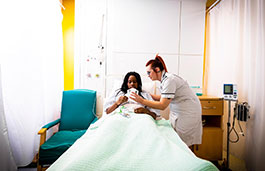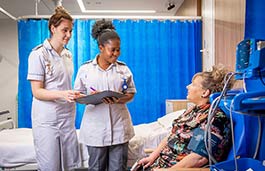Search
Paramedic Science BSc (Hons)
Study level: UndergraduateProfessionally Accredited Programmes
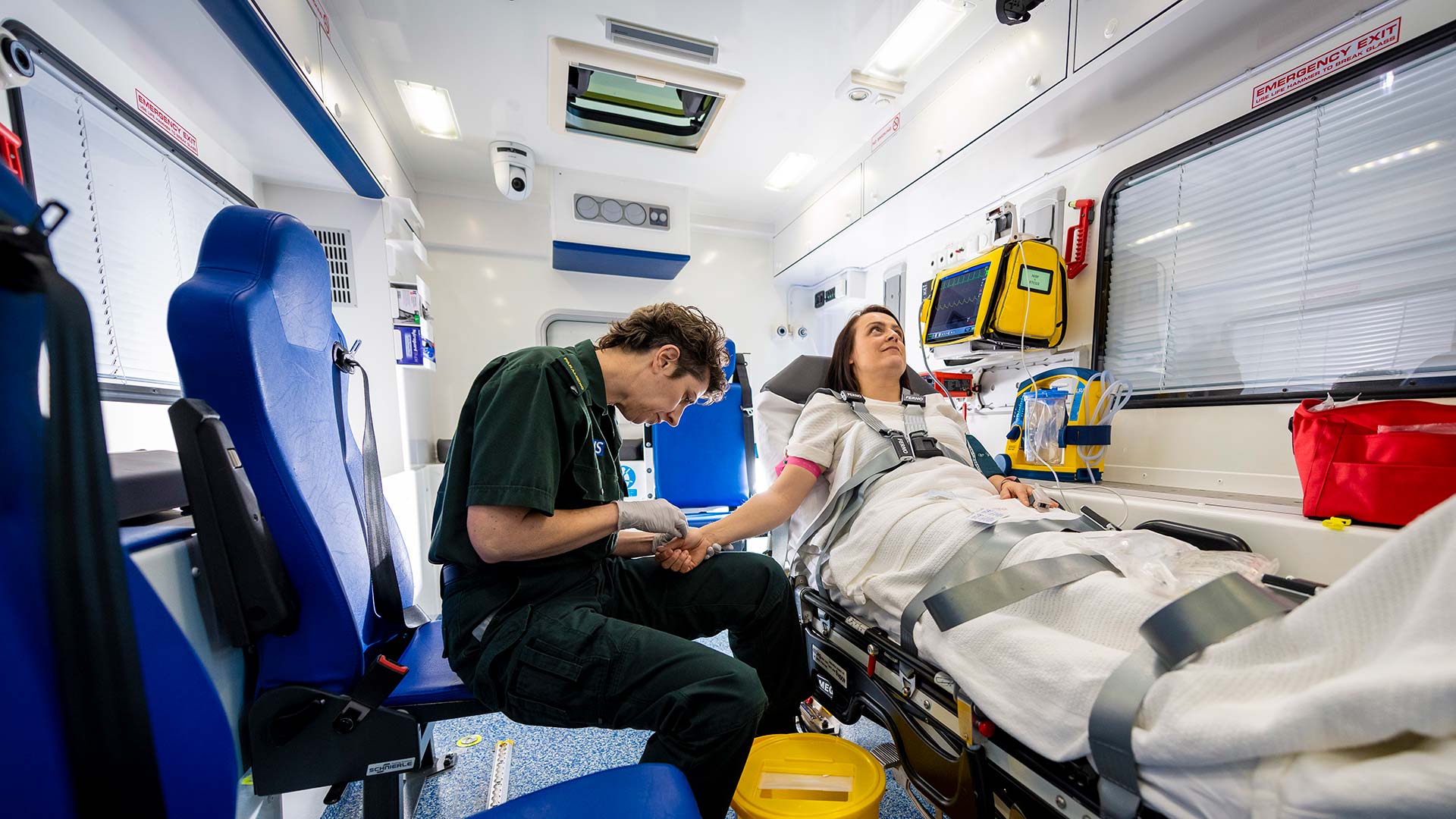
Our Paramedic Science degree prepares you to work at the frontline of patient care. Paramedics work in dynamic environments and administer a range of often life-saving treatments to people suffering from traumatic injuries and/or medical problems.
Course features
Course option
Year of entry
Location
Coventry University (Coventry)
Study mode
Full-time
Duration
3 years full-time
UCAS codes
HU11
Start date
January 2026
Course overview
Paramedics are often the first emergency service on the scene but also work in a multitude of settings including GP surgeries and the community. This course aims to prepare you for the challenges of providing emergency and urgent care to a diverse population in pre-hospital and out-of-hospital environments.
- Successful completion means you can apply for professional registration with the Health and Care Professions Council (HCPC) as a Paramedic (please see Accreditation section for more information).
- Develop the skills and medical knowledge needed to provide safe and effective paramedic care.
- Learn to thrive in dynamic health and care environments and multidisciplinary teams, developing clinical reasoning, relationship and teamworking skills alongside your understanding of healthcare systems.
- Focus on one academic module at a time, with five weeks of learning followed by one week of assessment per module.
- Hands-on experience through practice-based learning includes simulated learning and placement opportunities across the NHS to help you decide the direction of your future career2,5.
- All eligible students on this course can apply for a minimum payment from the Government of £5,000 per year, with additional payments for students incurring childcare costs6.
Rated Gold Overall
Teaching Excellence Framework (TEF) 20235 QS Stars for Teaching and Facilities
QS Stars University RatingsTop 5 Student City in England (Coventry)
QS Best Student Cities Index 2026Why you should study this course
- Our approach supports you to develop a strong sense of professional identity as a paramedic from the outset.
- You’ll be encouraged to develop digital fluency and think critically about the use of technology and the future direction of the profession as it changes.
- We introduce you to international perspectives of paramedic practice, examining different approaches to paramedic care from around the world.
- Opportunities for international experiences, including collaborative online projects with students from other universities abroad2.
- Access to success coaches, placement supervisors and specialist support for mathematics and academic writing4.
Studying in the School of Health and Care
Gain the skills and experience to transform lives, communities and the future of healthcare delivery. We aim to empower you to become a stand-out healthcare professional, capable, competent and confident in your field and role within the wider healthcare team.
While continuously developing your sense of professional identity as a paramedic from day one, you'll also collaborate with learners from other School of Health and Care fields, learning in an environment that puts inclusivity, diversity and dignity at its heart.
No. 10 for Paramedic Science
The Complete University Guide 2025
Accreditation and professional recognition
The degree is recognised and accredited1 by the following bodies:

Health and Care Professions Council
The degree is currently accredited by the Health and Care Professions Council (HCPC)1. Following changes that have been made to improve the course, we will apply for re-accreditation for entrants of 2025-26. If any changes occur with respect to our accreditation, we will notify applicants and students as soon as possible. This is a normal part of the process of continuous improvement of our courses to ensure they remain up-to-date and reflect best practice.
What you'll study
We regularly review our course content, to make it relevant and current for the benefit of our students. For these reasons, course modules may be updated.
How you'll learn
We understand that everyone learns differently, so this course will consist of structured teaching sessions which can include:
- on-campus lectures, seminars and workshops
- group work
- self-directed learning
- Virtual Simulated Placements
- practical-based learning2,5.
Teaching contact hours
As a full-time undergraduate student, you will study modules totalling 120 credits each academic year. A typical 20-credit module requires a total of 200 hours study. This is made up of teaching contact hours, guided and independent study.
Teaching hours
Teaching hours vary each semester, year of study and due to module selection. During your first year you can expect 15-18 teaching hours each week. You will also have the option to attend optional sessions including time with a progress coach or to meet with staff for advice and feedback. As you progress through your studies, teaching hours may reduce.
Practice-based learning
Practice-based learning forms an essential and significant part of your learning experience. Practice hours will differ between placements and different health and care courses. You will have access to University staff but should expect to spend the majority of your contact time with practice collaborators undertaking placement activity. Overall, the hours you undertake in practice-based learning will need to satisfy the eligibility requirements set by the course of 1012 hours. These will be gained from a combination of placement and simulated learning and will need to be completed over the course of your degree. Practice-based learning may take place during evenings, nights and weekends in line with the requirements of the paramedic role.
Guided and independent study
Throughout your studies, you will be expected to spend time in guided and independent study to make up the required study hours per module. You’ll be digging deeper into topics, review what you’ve learned and complete assignments. This can be completed around your personal commitments. As you progress through your studies, you’ll spend more time in independent study.
Online learning
As an innovative university, we use different teaching methods including online tools and emerging technologies. So, some of your teaching hours and assessments may be delivered online.
Assessment
This course will be assessed using a variety of methods which will vary depending upon the module.
Assessment methods may include:
- coursework
- practice placement2,5
- formal examinations
- Objective Structured Clinical Examinations
- presentations.
The Coventry University Group assessment strategy ensures that our courses are fairly assessed and allows us to monitor student progression towards achieving the intended learning outcomes.
International experience opportunities
We will introduce you to international perspectives of paramedic practice, examining different approaches to paramedic care from around the world. You may also have the opportunity to collaborate on projects with students from other universities abroad as part of COIL (Collaborative Online International Learning) projects2.
Mum of two preparing to graduate as paramedic
Gemma White is fulfilling her lifelong ambition of becoming a paramedic after returning to education at the age of 37. Now in her third year on Coventry University’s paramedic science course, Gemma is on the final stretch to seeing that dream become a reality.
Read more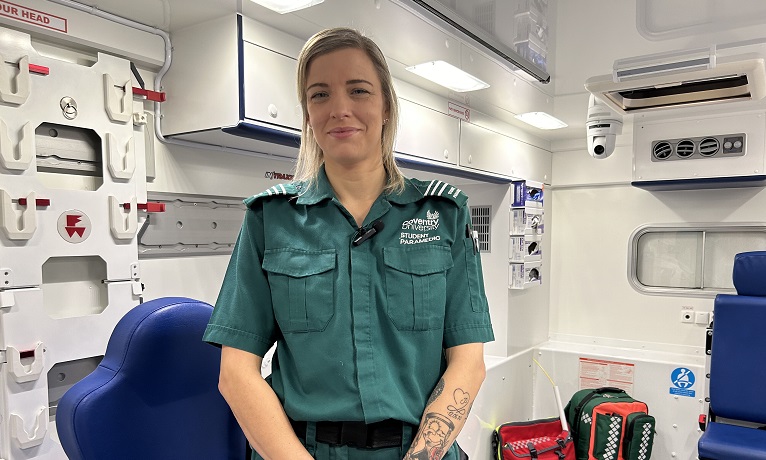
Entry requirements
Typical entry requirements:
Not got the required grades? We offer this degree with an integrated foundation year.
Fees and funding
| Student | Full-time | Part-time |
|---|---|---|
| UK, Ireland*, Channel Islands or Isle of Man | £9,535 per year | Not available |
| EU | £9,535 per year with EU Support Bursary** £16,800 per year without EU Support Bursary** |
Not available |
| International | £16,800 per year | Not available |
A non-repayable grant of £5,000 and extra payments worth up to £3,000 may be available to eligible students for each year of study6. Read more about this in the NHS Learning Support Fund information booklet.
For advice and guidance on tuition fees and student loans visit our Undergraduate Finance page and see The University’s Tuition Fee and Refund Terms and Conditions.
The University will charge the tuition fees that are stated in the above table for the first Academic Year of study. The University will review tuition fees each year. For UK (home) students, if Parliament permits an increase in tuition fees, the university may increase fees for each subsequent year of study in line with any such changes. Note that any increase is expected to be in line with inflation.
For international students, we may increase fees each year, but such increases will be no more than 5% above inflation. If you defer your course start date or have to extend your studies beyond the normal duration of the course (e.g. to repeat a year or resit examinations) the University reserves the right to charge you fees at a higher rate and/or in accordance with any legislative changes during the additional period of study.
We offer a range of International scholarships to students all over the world. For more information, visit our International Scholarships page.
Tuition fees cover the cost of your teaching, assessments, facilities and support services. There may be additional costs not covered by this fee such as accommodation and living costs, recommended reading books, stationery, printing and re-assessments should you need them. Find out what's included in your tuition costs.
The following are additional costs not included in the tuition fees:
- Any optional overseas field trips or visits: £400+ per trip.
- Any costs associated with securing, attending or completing a placement (whether in the UK or abroad).
Course essential costs
We will provide you with the uniform and personal protective equipment that you will need (including fluorescent jacket and rescue helmet), but you will need to purchase your own personal protective footwear for training purposes and for your practice placement areas.
You will need to meet the cost of travelling to and from the various emergency practice and non-emergency placement settings.
*Irish student fees
The rights of Irish residents to study in the UK are preserved under the Common Travel Area arrangement. If you are an Irish student and meet the residency criteria, you can study in England, pay the same level of tuition fees as English students and utilise the Tuition Fee Loan.
**EU Support Bursary
Following the UK's exit from the European Union, we are offering financial support to all eligible EU students who wish to study an undergraduate or a postgraduate degree with us full-time. This bursary will be used to offset the cost of your tuition fees to bring them in line with that of UK students. Students studying a degree with a foundation year with us are not eligible for the bursary.
Facilities
Our multi-million-pound Alison Gingell Building features a range of mock healthcare settings, including hospital wards, ambulance, therapy suites and community houses, giving you the opportunity to replicate real-life situations before you go on placement.
Our clinical skills labs are equipped with a range of pre-hospital training equipment, Advanced Life Support (ALS) manikins and equipment. We may also work with service-user volunteers who play the part of patients to enhance the realism and help with scenario learning.
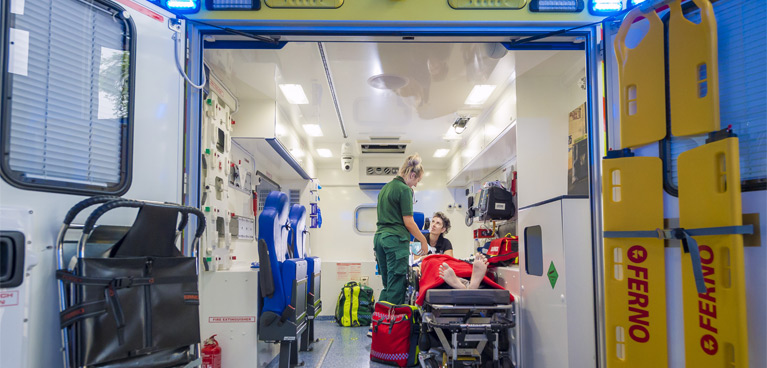
Ambulance
Our ambulance simulator provides the opportunity to undertake realistic patient treatment scenarios that encompass an area of healthcare unique to the paramedic profession. The simulator is intended to help you become familiar with the layout of an ambulance before you undertake clinical practice placements with a paramedic mentor2,5.
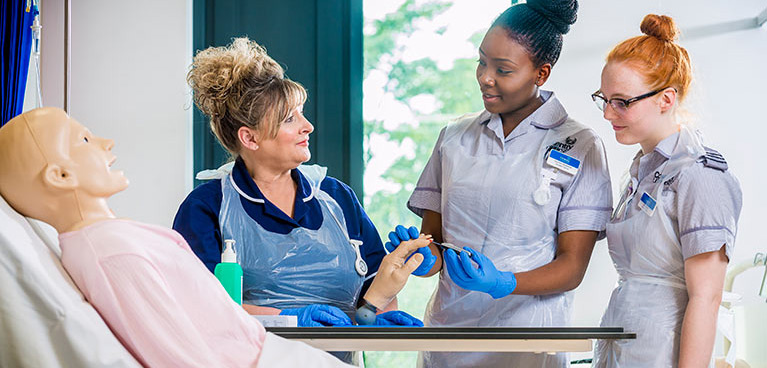
Mock hospital wards
Our mock hospital wards and critical care settings give you the chance to experience patient scenarios in a real-world environment.
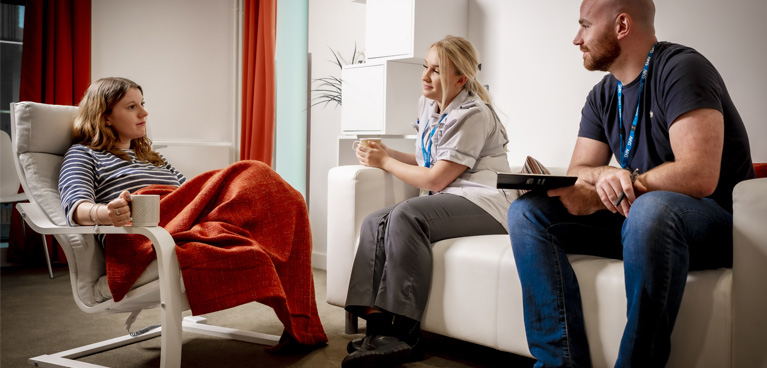
Community houses
Learn how to work with patients outside of a hospital setting in our simulated, two full-size community homes, specifically built for teaching.
Facilities are subject to availability. Access to some facilities (including some teaching and learning spaces) may vary from those advertised and/or may have reduced availability or restrictions where the university is following public authority guidance, decisions or orders.
Careers and opportunities
Our course is designed to prepare you personally and professionally for a successful career as a paramedic. You will have the opportunity to develop a wide range of practical and academic skills which you will put into practice on your placements.
Using scenario and simulation-based teaching techniques will help you to put theory into context. Using the ambulance simulator, community houses and other facilities will provide the opportunity to undertake realistic patient treatment scenarios before you go onto your placements.
Exposure to the clinical setting of a NHS ambulance trust during your placements2,5 is an essential part of your course and is designed to prove invaluable if you are considering future career options following graduation, for example as a registered paramedic.
Coventry University is committed to preparing you for your future career and giving you a competitive edge in the graduate job market.
Paramedic graduates from Coventry University are much sought after by NHS Ambulance Trusts and the majority of our past graduates have secured employment in the paramedic field even before they have completed their course. We work closely with different ambulance trusts and other healthcare providers and many of our graduates choose to secure employment with one of these placement providers when they graduate.
The university offers a wide range of support services to help you plan and prepare for your career options upon graduation.
Where our graduates work
While most graduates initially choose to work in an NHS Ambulance Trust setting, the range of job opportunities available to a qualified paramedic is expanding. Careers available outside an NHS ambulance trust include careers within a hospital or doctors' practice, special events cover, forensic paramedics or even with a private ambulance service.
How to apply
You may also like

Operating Department Practice BSc (Hons)
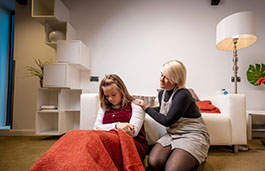
Learning Disabilities Nursing BSc (Hons)
